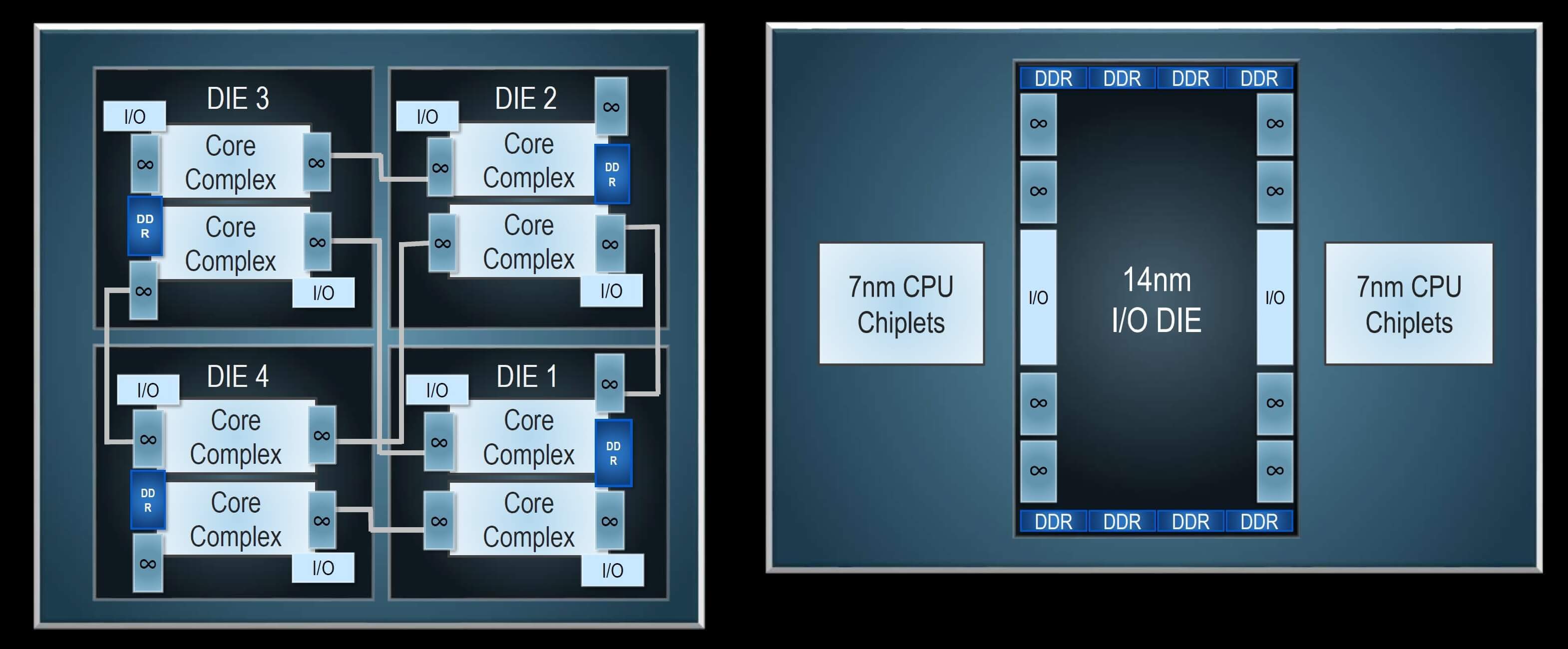LemmingOverlrd
Posts: 86 +40
Something to look forward to: The new Zen 2 CPU design promises to deliver performance and security improvements throughout, as well as lower power consumption and more flexible CPU setups thanks to its innovative chiplet design.

AMD has announced the launch of its latest chip design, Zen 2, introducing the first x86 7nm CPU to the market, and detailing its many architectural improvements.
At today's AMD Next Horizon event, AMD presented its first 7nm server CPU based on its new Zen 2 architecture. 'Rome', as this iteration of Epyc is known, is the follow-up to 'Naples' and effectively doubles-up on a number of core features of its predecessor, it is also happens to be drop-in compatible with 'Naples' which will bring added savings to the first-gen adopters.
It's a 64-core / 128-thread design, PCIe 4.0-supporting behemoth, delivering a claimed 4x FPU performance increase per socket. The 7nm process, developed in tight partnership with TSMC, is set to also deliver gains in other metrics: twice the transistor density, half the power consumption (for the same performance) and 25% more performance (at the same power envelope). Of course these are either/or situations, AMD will be able to deliver added performance for the same power or massive power savings for identical (Naples-like) performance.
Apart from this, Zen 2 brings along architectural improvements throughout; all contributing to the performance gains: a more advanced branch predictor, security enhancements to stave off Spectre-like vulnerabilities, improved execution pipeline, better instruction pre-fetching and larger Ops cache (to name a few).
But there's more. Zen 2 is a departure from the monolithic CPUs that, while bringing the aforementioned density, power, and core configuration gains, also introduces a design concept which both AMD and Intel have been gushing about for a few years now: a modular CPU built on an interconnect (Infinity Fabric) linking multiple CPU chiplets (in this case, the CCX).
Below you can see Zen (on the left) and Zen 2 (on the right):

In Zen 2, each 7nm chiplet contains 8 physical cores and sits on a second gen Infinity Fabric interconnect (built on a 14nm process), connecting the CCX clusters. This enables AMD to add increased flexibility to the CPU designs and, eventually, roll out lower-ranking SKUs such as a next-gen Threadripper and Ryzen 3xxx series CPUs. It also means that AMD found the semiconductor manufacturing Holy Grail, as it can keep costs way down by producing small area (high yield) 7nm dies, and connect them via the 14nm-built infinity fabric. It will essentially punch out multiple CPU SKUs from a single package setup (altough, this is arguably overkill for desktop Zen 2).
Sticking to the plan seems to be working wonders at AMD. The company launched Zen in 2017, improved it with Zen+ this year, and is now following through with its next design, the Zen 2.

The long-term planning, which Lisa Su frequently highlighted, allowed it to outmaneuver Intel in the datacenter as it reliably delivered on promises and now allows it to steal the thunder from Intel's 10nm server design, 'Ice Lake'. Zen 2 is here, Ice Lake is still a year away. Intel has been failing to deliver on its promises. AMD has not.
According to AMD, partners are queuing to sign up for 'Rome' right now, and that is bad news for Intel.

Lisa Su, AMD CEO, Zen 2 'Rome' in hand, at the AMD Next Horizon event, today.
AMD has been on a roll ever since the initial Zen launch, taking back market share, shoring up industry partners and restoring consumer faith. Maybe one of the most disregarded facts is that AMD has outlined a multi-year plan which it is following (thus far) to a fault, rekindling the long-lost competition in the x86 CPU arena.
There was no word on desktop CPUs (I.e. Castle Peak), but the news so far bodes well for the AMD camp.
https://www.techspot.com/news/77275-amd-launches-zen-2-datacenter-world-first-x86.html